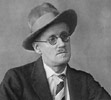Music and Texts of GARY BACHLUND
Vocal Music | Piano | Organ | Chamber Music | Orchestral | Articles and Commentary | Poems and Stories | Miscellany | FAQs
Chamber Music - (1991)
James Joyce
Nine songs for high or medium voice and piano
i. Make Music Sweet [ 1 pages, circa 1' 00" ]
Strings in the earth and air
Make music sweet;
Strings by the river where
The willows meet.
There's music along the river
For Love wanders there,
Pale flowers on his mantle,
Dark leaves on his hair.
All softly playing,
With head to the music bent,
And fingers straying
Upon an instrument.
ii. Twilight [ 2 pages, circa, 2' 15" ]
The twilight turns from amethyst
To deep and deeper blue,
The lamp fills with a pale green glow
The trees of the avenue.
The old piano plays an air,
Sedate and slow and gay;
She bends upon the yellow keys,
Her head inclines this way.
Shy thoughts and grave wide eyes and hands
That wander as they list--
The twilight turns to darker blue
With lights of amethyst.
iii. Goldenhair [ 2 pages, circa 1' 30" ]
Lean out of the window,
Goldenhair,
I hear you singing
A merry air.
My book was closed;
I read no more,
Watching the fire dance
On the floor.
I have left my book,
I have left my room
For I heard you singing
Through the gloom,
Singing and singing
A merry air.
Lean out of the window,
Goldenhair.
iv. Where Love Did Sometime Go [ 1 pages, circa 1' 15" ]
O cool is the valley now
And there, love, will we go
For many a choir is singing now
Where Love did sometime go.
And hear you not the thrushes calling,
Calling us away?
O cool and pleasant is the valley
And there, love, will we stay.
v. Pain [ 2 pages, circa 1' 00" ]
Because your voice was at my side
I gave him pain,
Because within my hand I held
Your hand again.
There is no word nor any sign
Can make amend--
He is a stranger to me now
Who was my friend.
vi. Companion [ 1 page, circa 1' 00" ]
He who hath glory lost nor hath
Found any soul to fellow his,
Among his foes in scorn and wrath
Holding to ancient nobleness,
That high unconsortable one--
His love is his companion.
vii. Gentle Lady [ 1 page, circa 1' 15" ]
Gentle lady, do not sing
Sad songs about the end of love;
Lay aside sadness and sing
How love that passes is enough.
Sing about the long deep sleep
Of lovers that are dead, and how
In the grave all love shall sleep:
Love is aweary now.
viii. Rain Has Fallen [ 2 pages, circa 1' 15" ]
Rain has fallen all the day.
O come among the laden trees:
The leaves lie thick upon the way
Of memories.
Staying a little by the way
Of memories shall we depart.
Come, my beloved, where I may
Speak to your heart.
ix. I Hear an Army [ 3 pages, circa 2' 00" ]
I hear an army charging upon the land,
And the thunder of horses plunging, foam about their knees:
Arrogant, in black armour, behind them stand,
Disdaining the reins, with fluttering whips, the charioteers.
They cry unto the night their battle-name:
I moan in sleep when I hear afar their whirling laughter.
They cleave the gloom of dreams, a blinding flame,
Clanging, clanging upon the heart as upon an anvil.
They come shaking in triumph their long, green hair:
They come out of the sea and run shouting by the shore.
My heart, have you no wisdom thus to despair?
My love, my love, my love, why have you left me alone?
[ Total duration, 15 pages, 12' 15" ]
James Joyce
From the 1909 edition, Joyce says:
"Perhaps this book I send you now will outlive both you and me. Perhaps the fingers of some young man or young girl (our children's children) may turn over its parchment leaves reverently when the two lovers whose initials are interlaced on the cover have long vanished from the earth. Nothing will remain then, dearest, of our poor human passion-driven bodies and who can say where the souls that looked on each other through their eyes will then be. I would pray that my soul be scattered in the wind if God would but let me blow softly for ever about one strange lonely dark-blue rain-drenched flower in a wild hedge at Aughrim or Oranmore."
Of the last song's text, Yeats wrote to Joyce on 18 Dec 1902: "a charming rhythm in the second stanza, but... not one of your best lyrics as a whole... the thought is a little thin... the poetry of a young man who is practicing his instrument, taking pleasure in the mere handling of the stops..."Yeats showed it to Ezra Pound in Dec 1913, who bought it for his anthology Des Imagistes Yeats reconsidered and wrote in July 1915: "a technical and emotional masterpiece."
Tessitura for high voice
The score for Chamber Music is available as a free PDF download, though any major commercial performance or recording of the work is prohibited without prior arrangement with the composer. Click on the graphic below for this piano-vocal score.

